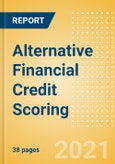Summary
Alternative lenders and big tech have developed fundamentally new approaches to credit assessment, incorporating a wider variety of data sources such as history of utility bill payments, rent payments, repayments to payday lenders, social media data, browsing and search history, employment history, educational background, and even psychometric testing. This report explores the alternative approaches to credit scoring that are being deployed in the financial services industry.
The market for alternative credit scoring comprises a vast ecosystem of provider types and business models. Much of it exists, by definition, outside of traditional financial services in the form of alternative lenders, niche fintech providers, and big tech. However, incumbent banks are also innovating, while challenger banks and credit bureaus are launching a variety of new data-driven decision-making techniques - especially in emerging markets.
Scope
Reasons to Buy
Alternative lenders and big tech have developed fundamentally new approaches to credit assessment, incorporating a wider variety of data sources such as history of utility bill payments, rent payments, repayments to payday lenders, social media data, browsing and search history, employment history, educational background, and even psychometric testing. This report explores the alternative approaches to credit scoring that are being deployed in the financial services industry.
The market for alternative credit scoring comprises a vast ecosystem of provider types and business models. Much of it exists, by definition, outside of traditional financial services in the form of alternative lenders, niche fintech providers, and big tech. However, incumbent banks are also innovating, while challenger banks and credit bureaus are launching a variety of new data-driven decision-making techniques - especially in emerging markets.
Scope
- Amid COVID-19, the millions of otherwise careful, frugal customers, who scored well under traditional models have become non-creditworthy. Continued reliance on traditional risk measures could prove pro-cyclical, choking off credit supply for those struggling small businesses that will be so critical to economic recover.
- Big data technology allows alternative lenders to collect and use a larger volume and variety of data points. For example, Ant Financial and Mercado Libre claim that their credit quality assessment typically involves more than 1,000 data series per loan applicant.
- Digital technologies - cloud, robotic process automation, big data - help digital lenders process massive loan volumes quickly and restructure loans at minimal marginal costs.
Reasons to Buy
- Understand the key technology, macroeconomic, political, and regulatory trends driving alternative credit scoring.
- Access the latest consumer survey data on evolving channel behavior, provider preferences, and product holding.
- Understand key competitive inroads for alternative lenders to gain market share.
- Understand market share and growth prospects for niche fintech and big tech lenders.
- Access firm-level/case study insight on leading fintech credit risk partners for incumbent banks.
Table of Contents
- Executive summary
- Players
- Thematic briefing
- Trends
- Technology trends
- Macroeconomic and political trends
- Regulatory trends
- Industry analysis
- Market size and growth forecasts
- Mergers and acquisitions
- Timeline
- Value chain
- Niche fintech/alternative lenders
- Big tech
- Credit bureaus
- Aggregators
- Companies
- Big tech
- Credit bureaus
- Niche fintech/alternative lenders
- Banks
- Sector scorecards
- Banking sector scorecard
Glossary
- Further reading
- Thematic research methodology
- About the publisher
- Contact Us
Companies Mentioned (Partial List)
A selection of companies mentioned in this report includes, but is not limited to:
- Amazon
- Apple
- Alphabet
- Tinkoff Bank
- AIB
- Capital One
- WeBank
- MYbank
- Monzo
- NatWest
- RBS
- Danske Bank
- DBS
- TSB
- BBVA
- Citibank
- mBank
- Revolut
- Credit Agricole
- Barclays
- CreditLadder
- NovaCredit
- Experian
- Equifax
- TransUnion








